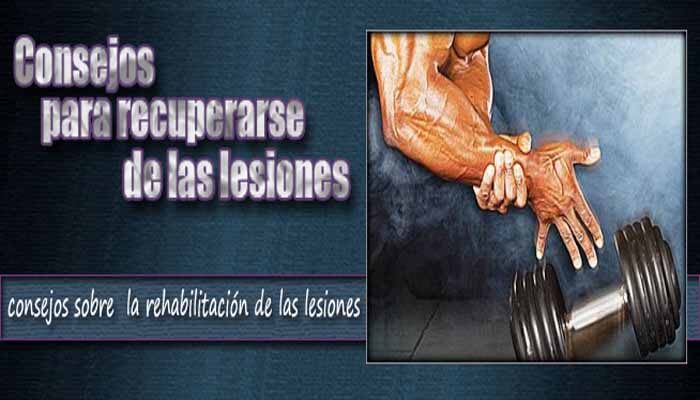Injuries happen at the worst possible time – everything is perfect until something tragic happens out of nowhere. Maybe you pull / tear a muscle, sprain your ankle, or break a bone or joint. You may be in the squat rack, on the bench press, jogging, or just walking down the street. There are a wide variety of injuries that can be sustained, and each takes different amounts of time and rest to heal. The problem with injuries is that they frustrate athletes. An injury can make you feel like all your progress is ruined and your motivation smashed to pieces.

Tips to recover from injuries
In this article I will give some tips so that you can heal the wounds / injuries and maintain rapid progress without risking a new injury.
1. Learn from your mistakes
If your injury was one of those weird accidents (you tore a tendon while walking), that’s one thing, but if the injury occurred while exercising at the gym, then you need to analyze what it was you did wrong in that exercise. There is no point in applying a solution if the problem is not known, as it could make things worse or allow the problem to recur or become more serious.
Don’t be proud or mean. If you need to see a doctor or physical therapy specialist, do so. If you already know exactly what happened to you, you will save more money and time in the long run.
2. Accommodates the diet
If due to bad luck we have an injury and we have to rest a season outside the gym, this is not an excuse to lose muscles or gain kilos of body fat. Do not sit on the couch eating large amounts of simple carbohydrates and fats, or succumb to an alcohol binge. You can still maintain the muscles gained by eating a proper diet.
It’s all about settings. If your injury allows you to do half of your training (2-3 days), you should be able to maintain your current macronutrient intake. But if the injury is very serious and you probably miss more than half of your workouts, we will have to back off a bit in food consumption. As long as your diet adapts to your activity level, everything will be fine.
Remember that you should not cut calories from one day to the next, because your body needs macronutrients to repair the injury and also to avoid a drop in our testosterone.
3. The training
An injury means that your body is not working 100%, so you should not expect it to. After an injury, it is very important to ensure that your workouts are kept at the highest possible level without causing a new injury. You must know what area to protect and not overload where we have the injury.
This is also the perfect time to start working on a specialized training program to target the weaker and non-injured areas of your body as we recover from the injury.
4. Rehabilitation
The worst thing to do after an injury is not to seek the advice of a rehabilitation specialist, and not heed their advice. With the help of a doctor or specialist we will recover faster and we can go back to training as we did before.
People often do nothing after an injury and when they feel better, they simply suffer another injury because their muscles go untrained for weeks or months. Don’t let recovery from your injury stall your progress!

5. “Slower”
Yes, you need to train and do rehab exercises, but don’t make the mistake of doing more sets or heavier weights in an attempt to recover as quickly as possible, almost at lightning speed. You are human, not lightning.
Your body naturally works hard to recover, and if you ask too much of it, bad things can happen (re-injure yourself for example).

